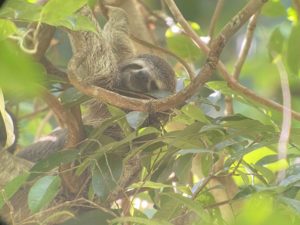 I took this photo yesterday in Manuel Antonio National Park, and then found this poem by Yuseff Komunyakaa.
I took this photo yesterday in Manuel Antonio National Park, and then found this poem by Yuseff Komunyakaa.
Sloth
If you’re one of seven
Downfalls, up in your kingdom
Of mulberry leaves, there are men
Betting you aren’t worth a bullet,
That your skin won’t tan into a good
Wallet. As if drugged in the womb
& limboed in a honeyed languor,
By the time you open your eyes
A thousand species have lived
& died. Born on a Sunday
Morning, with old-world algae
In your long hair, a goodness
Disguised your two-toed claws
Bright as flensing knives. In this
Upside-down haven, you’re reincarnated
As a fallen angel trying to go home.
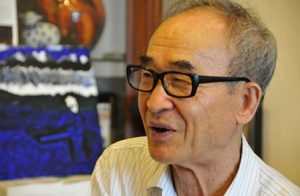 I am a little embarrassed that I have discovered K-dramas, the vast output of Korean soap operas on Netflix. My favorite so far is Navillera (Butterfly) about a 70-year-old retired postman who has always wanted to study ballet. I like the glimpse into modern Korea they provide. I also have discovered a Korean poet whose sensibility appeals to me, Ko Un. Here’s a sample of his work. I like how how he uses the gradual blossoming of spring flowers to knit his divided country together:
I am a little embarrassed that I have discovered K-dramas, the vast output of Korean soap operas on Netflix. My favorite so far is Navillera (Butterfly) about a 70-year-old retired postman who has always wanted to study ballet. I like the glimpse into modern Korea they provide. I also have discovered a Korean poet whose sensibility appeals to me, Ko Un. Here’s a sample of his work. I like how how he uses the gradual blossoming of spring flowers to knit his divided country together: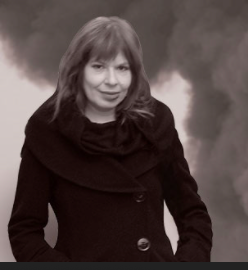 This is from a book called Words for War: New Poems from Ukraine. Of course, the poems here come from the 2014 war, not the current one. How sad for this poor, tattered country.
This is from a book called Words for War: New Poems from Ukraine. Of course, the poems here come from the 2014 war, not the current one. How sad for this poor, tattered country.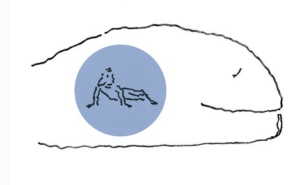 This is a daunting title for a poem, but Lynn Emanuel pulls it off:
This is a daunting title for a poem, but Lynn Emanuel pulls it off: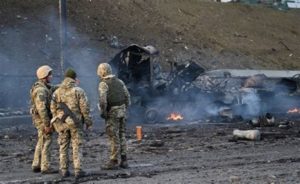 Watching news of the ongoing invasion of the Ukraine, where my father was born, reminds me of the fragility of the equilibrium we take for granted.
Watching news of the ongoing invasion of the Ukraine, where my father was born, reminds me of the fragility of the equilibrium we take for granted. This French song form, made famous in English by Dylan Thomas and Elizabeth Bishop, is so tricky. The repeating first and third lines doubled at the end, is a form that it’s very hard to make sound natural. I think
This French song form, made famous in English by Dylan Thomas and Elizabeth Bishop, is so tricky. The repeating first and third lines doubled at the end, is a form that it’s very hard to make sound natural. I think  I have noticed over my association with many poets, that there were many times a male poet might write a stunning love poem to a woman that he treated pretty shabbily. Not always the case, but it made me less jealous that I wasn’t getting so many love poems.
I have noticed over my association with many poets, that there were many times a male poet might write a stunning love poem to a woman that he treated pretty shabbily. Not always the case, but it made me less jealous that I wasn’t getting so many love poems.
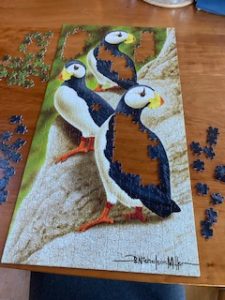
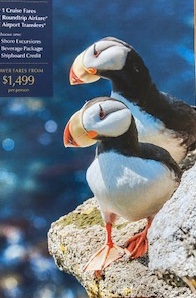 This weekend I had my grandsons overnight and broke out the Puffin puzzle, which we had a lot of fun with, but didn’t finish. Then the Sunday NY Times arrived, with a brochure for cruise ships. It had this image on the cover.
This weekend I had my grandsons overnight and broke out the Puffin puzzle, which we had a lot of fun with, but didn’t finish. Then the Sunday NY Times arrived, with a brochure for cruise ships. It had this image on the cover.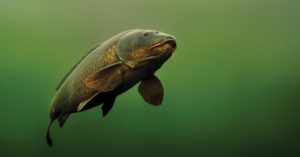 The Carp
The Carp